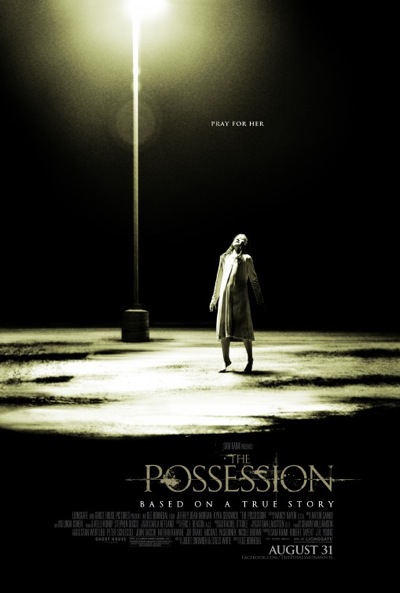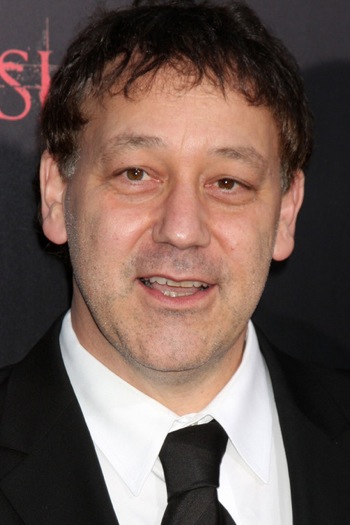
Ole Bornedal's THE POSSESSION is a smart, well-crafted variation on the hoary exorcism subgenre. The conventions are familiar, but the family story at the center of the film is genuine and adroitly played; you really like these people, which allows you to get more emotionally invested than you would watching some lazily-calibrated programmer assembled for nothing more than a quick box-office payoff. The film's hook is that it's loosely based on a true story about a family's horrifying experience with a dybbuk box - a cabinet which, according to Jewish folklore, contains an evil spirit. As in William Friedkin's THE EXORCIST, the supernatural force sets up shop in a young girl (an excellent Natasha Calis), which threatens to tear apart this already-splintered brood. But Bornedal, working from a screenplay by Juliet Snowden and Stiles White, avoids the body horror aspect, preferring instead to emphasize the psychological element (Calis's escalating bad behavior is perceived as acting out in response to her parents' separation). It's not a revolutionary film, but it's viscerally satisfying and, once the dybbuk asserts itself, creepy as hell.
The movie certainly bears Bornedal's fingerprints (recalling the slow-burn atmosphere of his original NIGHTWATCH), but it's got a slight mischievous streak that feels like the influence of its producer, Sam Raimi. Though Raimi is quick to credit Bornedal with the film's loopy sensibility, there's a particularly macabre scene with Calis and Grant Show that would be right at home in any of the director's "spook-a-blasts". If you're hankering for the Raimi touch, THE POSSESSION will tide you over until he gets around to directing another horror movie himself.
Happily, it sounds like this is exactly what he plans to do once he finishes production on OZ: THE GREAT AND POWERFUL. In the following interview, I ask Raimi about the development of THE POSSESSION, why he tapped Bornedal to direct it, and how he feels about the current state of the horror film. It was a brief chat, but I'll take any time with Raimi I can get.

Mr. Beaks: This is a very effective exorcism/possession film. As you were developing this film, were you conscious of the other films in this subgenre? How did you keep things fresh?
Sam Raimi: I was definitely aware of all those great possession films that had come before, and there's a lot of them. But that wasn't really my concern. I was just the producer on the film. I was trying to find the writers and help them find the right approach to telling a story that was connecting with me. We kept running into problems. It would've been a luxurious thing to have a story that was working and then say, "Hey, that's a little too similar to these other films." But we weren't even there yet. Most of all, we just kept hiring different writers to make a screenplay of the real events of the dybbuk box. I thought at the time "This has got to be real. This is such a terrifying real story, the screenplay cannot fool around. It's got to tell the exact story." But what happened was my desire to do that kept making for a bad screenplay, or a screenplay that wasn't dramatic. So I finally gave up on that, and said, "Okay, we'll just base it on the dybbuk box, and we'll tell a story with meaningful characters." And just one set of characters, because when we tried to follow all of those characters that the website talked about, it became disjointed. So really it was a much more basic search for how to tell this story. And once we hit upon Snowden and White, they cracked it for us. They said, "Just make it about one family," which we were thrilled about. "It has to only be based on the story." And we agreed that we'd just base it on the dybbuk box. Then they were able to tell the story of a family that was broken apart and had to find the goodness in themselves, to come together and heal each other, and overcome their differences to defeat this evil. Then it became a meaningful work of fiction.
And then Ole, more than me, had to look at the script and say, "You know, this might be too similar to something that happens in another film." I know that he went through that process, although I couldn't be specific as to what films he was looking out for. I just know that he worked to make it as original as possible.
Beaks: I'm a fan of Ole's original NIGHTWATCH. He's so good with atmosphere, which is something that's lacking in movies today. Mostly, they're edited at a pace that doesn't give the story or the audience time to breathe. This film does. Why did you bring him on?
Raimi: Well, I loved Ole's work from a different film - although I loved the one you mentioned. I loved his work from THE SUBSTITUTE. He really showed in that film that he's a great director of actors, that he understood character and, as you say, pace. But I was thinking about him from the point-of-view of a great director of actors, because the strength of this screenplay was the relationships in this family. So he became a very natural choice for us at Ghost House Pictures - which is myself, Robert Tapert, Nathan Kahane and Joe Drake. And our partners on this one was Lionsgate Films. But because of those strengths, and because I really liked him personally, he came to mind. We sent him the screenplay, and he loved it. He saw instantly that there was really just a story of a family that was broken first, and a horror film second. That's what really made it work for us. I was thrilled to have him aboard.
Beaks: Tonally, it is an effective family drama, but it's also very playful at times. There are some mischievous sequences that give the film a macabre sense of humor. How did you balance those tones?
Raimi: It was all Ole. He has a sly sense of humor that is also apparent in THE SUBSTITUTE. I think it just naturally comes to him like that. He sees the dark humorous underside to things, and puts that into his horror cocktail, which I'm a big fan of.
Beaks: It always happens with horror that a certain form or subgenre dominates, and we get a glut of films that are very much alike. In the '80s, it was slasher films. Now, it's found footage. How do you feel about the state of the horror film right now?
Raimi: I think Ole shows me that the horror film is alive and well. The audience is always out there, and the audience is the greatest part of the horror film. They always want something new and original and different and cutting edge. Sometimes, there's a lack of the right filmmaker or filmmakers who are providing the newest, most fantastic vision of what lurks beyond. But we always seem to produce those great filmmakers. Sometimes they come from overseas - Europe or Asia recently. I think the audience is alive and well, and we just need the next young visionary to step up and present their vision of the next really cool horror film. I think one of those guys is Fede Alvarez. I think his new EVIL DEAD is really going to knock the socks off of people. I haven't really seen his cut of the movie, but he sent a cut while he was shooting that was like an hour-and-twenty-minutes long. He still had three weeks to shoot, but I could tell that it was a great film in the making.
Beaks: Bruce Campbell just came out and said that as well. I think it's fascinating when you guys get to a point where you're allowing other filmmakers to reinterpret your work. You're letting them romp around in the playground that you created. How does that feel?
Raimi: It makes me feel old. (Laughs) But it's a blast. It's creatively very exciting to take an old song and then have a new, young, very hip, talented musician play it with you, and show you new aspects to it, new rhymes within the melody that you didn't realize. It's eye-opening and invigorating. It's a celebration of the old and the new. I love it.
Beaks: But your craft is still amazingly invigorated. DRAG ME TO HELL was a terrific movie. It also felt like a young man's movie. Has anything changed for you? How do you feel making a horror movie now as opposed to when you were hungry and making THE EVIL DEAD?
Raimi: I had a wonderful life experience making THE EVIL DEAD. I look back on it with the fondest of memories, but without forgetting how freaking hard it was physically, emotionally and mentally to make that picture. It really almost killed three of us: Rob, Bruce and myself. But I look back on it fondly. It was a great learning experience. I hope it entertained people. We put everything we had into it. We wanted nothing else than to scare 'em, make 'em laugh and wow 'em. That's the greatest reward of any filmmaker, to see the audience have that reaction. I just hope that it fulfilled expectations - not that there were many back then for low-budget filmmakers like us.
But I am invigorated when I make a horror film. It's exciting. There's nothing more exciting for me than to have a chance to entertain the audience. I do feel really young. The kid in me rises up, and is waiting around the corner to scare the audience, to lead them down a path and then jump out from behind and do all the terrible, mischievous things that a rotten nine-year-old wants to do. I just get really excited when I make a horror film, and I'd like to make another one after [OZ: THE GREAT AND POWERFUL].
Beaks: Please keep letting the nine-year-old kid out to play. We love that kid.
Raimi: (Laughs) Thanks a lot, pal!
THE POSSESSION hits theaters this Friday, August 31st. Check it out.
Faithfully submitted,
